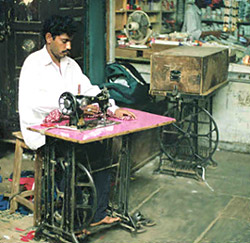 Darzi is the name of the tailor caste. In ancient India, it used to be common for a family to keep its own Darzi who is given a high position. Further, Darzis are considered as an urban caste. Scholars suggest that the name of the caste has been derived from Persian word darz, which means a seam. In the past, the name Sui derived from the term Sui, meaning a needle, was more popular. Darzis form a separate tribe and are divided into seven or eight sub-castes of clans, who do not intermarry. One of the most popular legends associated with their origin suggest that when Parasurama, incarnation of Vishnu was destroying the Kshatriyas, two Rajput brothers took shelter in a temple and a priest protected them. The priest set one of the brothers to sew the clothes for the idol and set the other one in dyeing the clothes. The first brother was known as the Chhipi and Darzis are said to be his descendents. The most common title of the Darzis is Khalifa. It is an Arabic word, which means `successor of the Prophet`. The caste is of recent formation.
Darzi is the name of the tailor caste. In ancient India, it used to be common for a family to keep its own Darzi who is given a high position. Further, Darzis are considered as an urban caste. Scholars suggest that the name of the caste has been derived from Persian word darz, which means a seam. In the past, the name Sui derived from the term Sui, meaning a needle, was more popular. Darzis form a separate tribe and are divided into seven or eight sub-castes of clans, who do not intermarry. One of the most popular legends associated with their origin suggest that when Parasurama, incarnation of Vishnu was destroying the Kshatriyas, two Rajput brothers took shelter in a temple and a priest protected them. The priest set one of the brothers to sew the clothes for the idol and set the other one in dyeing the clothes. The first brother was known as the Chhipi and Darzis are said to be his descendents. The most common title of the Darzis is Khalifa. It is an Arabic word, which means `successor of the Prophet`. The caste is of recent formation.
Darzis are recognised as a distinct caste today. Their mixed origin is proved by the names of their sub-castes and other exogamous clans. Name of one of the sub-divisions is Baman and it is named after Brahmin caste. It is one of the highest sub-divisions of the community. Next sub caste is the Rai or Raj Darzis. Kaithia is another sub caste. In Betul region, the Srivastav Darzis prohibit the marriage of widows. Another sub-caste of the community is the Chamarua. Other sub divisions of Darzi community are of territorial type like Khandeshi, Chhattisgarhi, Malwi, Mathuria and so on.
In northern India, many people belonging to Darzi community are Muhammadans. Women of the Darzi community are more conservative in their dress sense. There are certain indigenous customs prevalent in the Darzi community. However, the social customs of this community present no special feature or interest. For the Europeans Darzi is one of the best known of all the castes. Darzis are considered as capable workman. The busiest time is the season of marriage. Darzi people are very religious by nature.




















